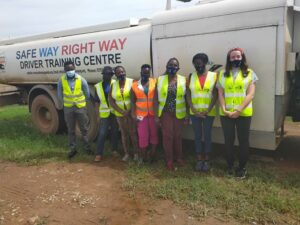Transaid has launched a new initiative to increase the number of female HGV and PSV drivers on the road, commencing with reviewing the approach taken by the Professional Driver Training – Uganda (PDTU) project, to ensure training is fully gender inclusive.
Uganda is experiencing a huge rise in demand for professional drivers which is expected to increase over the coming years, and Transaid believe encouraging more women into the sector will benefit transport companies, contribute to improved safety and generate new career opportunities for women.
Leading the charge for Transaid is Road Safety Project Manager Neil Rettie and Project Officer Abbie Rennison, a GXO graduate who has been seconded to work in Uganda for eight months.
Together, they have been reviewing course training materials to ensure they are appropriate to female and male drivers, working with trainers to ensure that their training styles are inclusive, plus adding new content on the importance of respect in the workplace. They are also reaching out to local firms to promote the benefits of hiring female drivers, with plans to hold workshops with prospective employers in the coming months.
Rettie says: “We know from research that female drivers are statistically safer on the road and take less risks than their male counterparts; plus, some examples show a reduction in fuel theft.
 “Yet the challenge we often face is companies wanting to take on drivers with experience; and suddenly we’re not only encouraging them to take on their first ever female driver, but also someone who is new to the sector. We are going to be setting out plans to actively engage with local firms to ensure they realise the benefits that female drivers bring.”
“Yet the challenge we often face is companies wanting to take on drivers with experience; and suddenly we’re not only encouraging them to take on their first ever female driver, but also someone who is new to the sector. We are going to be setting out plans to actively engage with local firms to ensure they realise the benefits that female drivers bring.”
Transaid has been tasked with training 750 drivers within its PDTU project between April 2021 and April 2023, of which at least 25 should be female.
“The target is quite low initially,” admits Rennison, “but targets were made to be broken! The hope is we can actually train a much higher percentage of female drivers; but even putting 25 through their training would be a fantastic start and the training centre could then work to build on that year-on-year.”
Key to the success of the PDTU project has been the development of a team of Master Trainers, whose job it is to train new trainers, ensuring that knowledge is retained locally. This also reduces the demand on driver trainers from the UK flying out to deliver training on secondment, making the project more sustainable.
It’s a model which is helping Transaid to realise huge benefits, with two of the Ugandan Master Trainers currently preparing to travel to Ghana, where they will spend one month training 14 new driver trainers on one of Transaid’s newest projects. These skills place Ugandan trainers at the heart of rolling out improved driver training standards in sub-Saharan Africa.
The PDTU is an initiative of the GIZ Employment and Skills for Development in Africa (E4D) programme which is funded by the German and Norwegian governments. The initiative is being implemented in partnership by Transaid and local non-governmental organisation Safe Way Right Way on behalf of GIZ E4D.
It is one of Transaid’s largest driver training programmes, currently running alongside similar projects in Ghana, Mozambique, Tanzania and Zambia.















